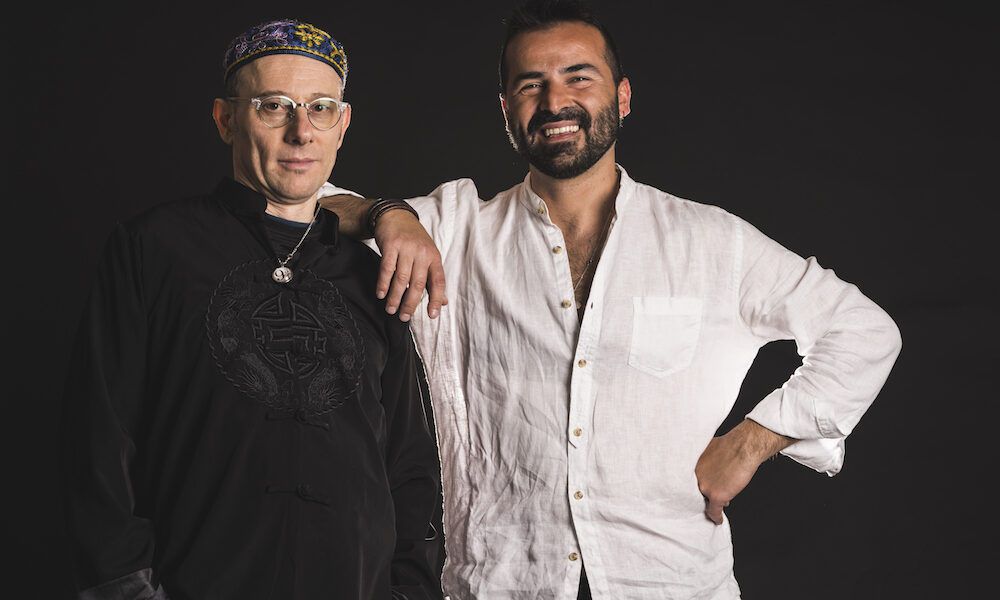“We tried to imagine and reproduce the places we lived in Africa and beyond with sounds. We imagined moments of daily life, indelible environments in our memories. We imagined the daily actions of African people, and in some moments we tried to reproduce the colors of their smiles”
Maurizio Lampugnani
Jazz wouldn’t be jazz without soul. Whether for that to be a soulful mourn at a guitarist’s fingertip or a lonesome story flew from the smoker’s lips, the heart always recognizes its vibration. For Leopoldo Sebastiani and Maurizio Lampugnani, it is landscape.
Sebastiani is a wise storyteller of Jazz guitar; Lampugnani, on the other hand, is a passionate explorer of world percussion. Duo Manibé expands Jazz vocabulary combining African timbre with jazz harmonies and synthesized sounds. They create a unique landscape to share memories and moments in life that mean a lot to them. From places they used to live in Africa to a smile they remembered, Duo Manibé recreates the touches, the smell, the scenery with sounds.
Landscape, produced by Music For Love, is a collection of memories. The album explores the concept of space from the physical space in which we live and breathe and the inner space where our memories and emotions are stored. The 11th track, “Zenko,” describes the experience of a festive celebration in Wolof (Senegal) with non-traditional instruments and sounds. Unlike western social convention that separates the role of performers and audiences, drumming and dancing in Africa is a communal activity in which everyone from the village participates. Shaker outlines a bass pattern, while Zenko plays the lead. Later on, bass guitar joins in for a call and response with Zenko. Duo Manibé keeps bringing in more instruments with short improvised lines to create flashbacks of communal celebration. It evolves into a non-conventional improvisation of which individual sounds stand out. Although the song is structurally deep-rooted in Wolof’s musical tradition, “Zenko” expresses the memory of a unique, personal experience by introducing electrified sounds and production techniques into storytelling.
The emotions consisted in the electrified African sounds are worth exploring. For Maurizio Lampugnani, the experience of living in Senegal and Guinea was life-altering. “Being in Africa for me is being in the mother of all lands,” said Lampugnani, “it is the country that makes you know the true values. It makes you always feel in a cradle. It makes you feel happy, serene, and grateful for life despite all the challenges.” Being closely connected to nature and other human beings in a place with limited access to resources changes one’s perspective in life and perception of sound. “Water is a natural element of great richness,” described Lampugnani. The artist also obtains sounds from instruments used in everyday life, for example, “calabase,” which is a rice container.
“Afrika Nuit,” the eighth track on the record, experiments with sounds in nature and from nonmusical instruments. Although Duo Manibé sets its tone in a similar environment as in “Zenko,” “Afrika Nuit” communicates an impression rather than a participating experience. Rooted in traditional Senegalese song and rhythmic patterns, Duo Manibé cleverly softened its color by an expressive style of singing and adding flute passages, played by the great jazz and pop instrumentalist Nicola Stilo.
Genre becomes blurry when it comes to the portrait of one’s inner space. “My Song’s Smile” is a warm and heartfelt flow of guitar and Zenko. “Supreme Allucinations” on the other hand is on the edge of a late night jazz jam and indigenous medicine. Duo Manibé introduced influences subtly and spontaneously. “Struggle” uses a wave drum to create the shattered sound, combined with nontonal runs to portray struggle. As ideas developing into patterns, it naturally reminisces an early new wave impression. Almost as if it was meant to be, the longing for the African drum cycle aesthetic is finally being released from the corner of memory.
Landscape has been well received by people around the world. The record won a Global Music Award in Jazz/World Music in 2020. The fourth track, “Supreme Allucinations,” has also received a nomination for HMMA award in the jazz category earlier in 2021. “African percussion for me is a continuous and main source of attraction,” said Maurizio Lampugnani, “I never get tired of listening to the sounds coming from percussion made with materials that nature itself offers,” explaining the duo’s everlasting desire to experiment, research, and create through nature and life.




